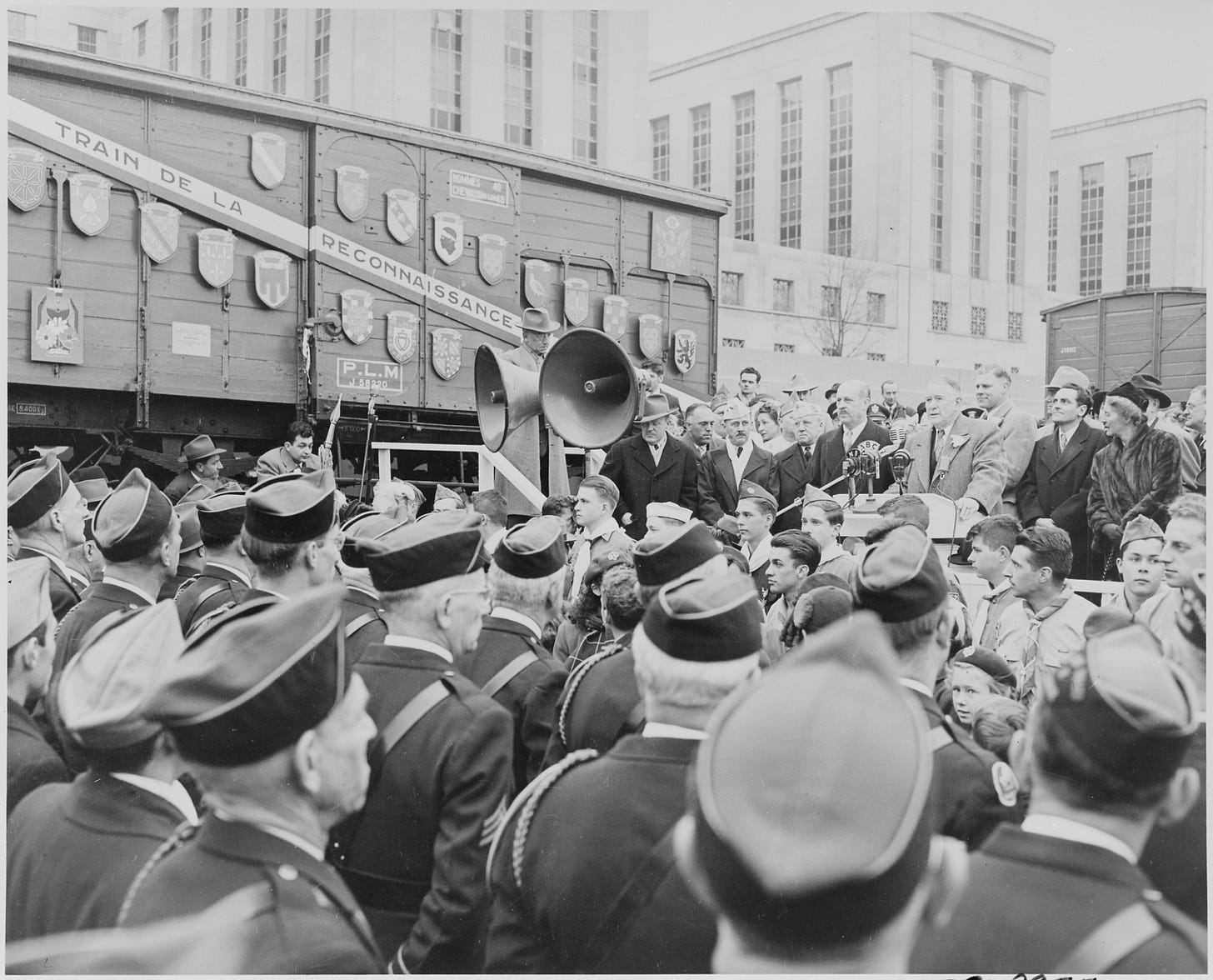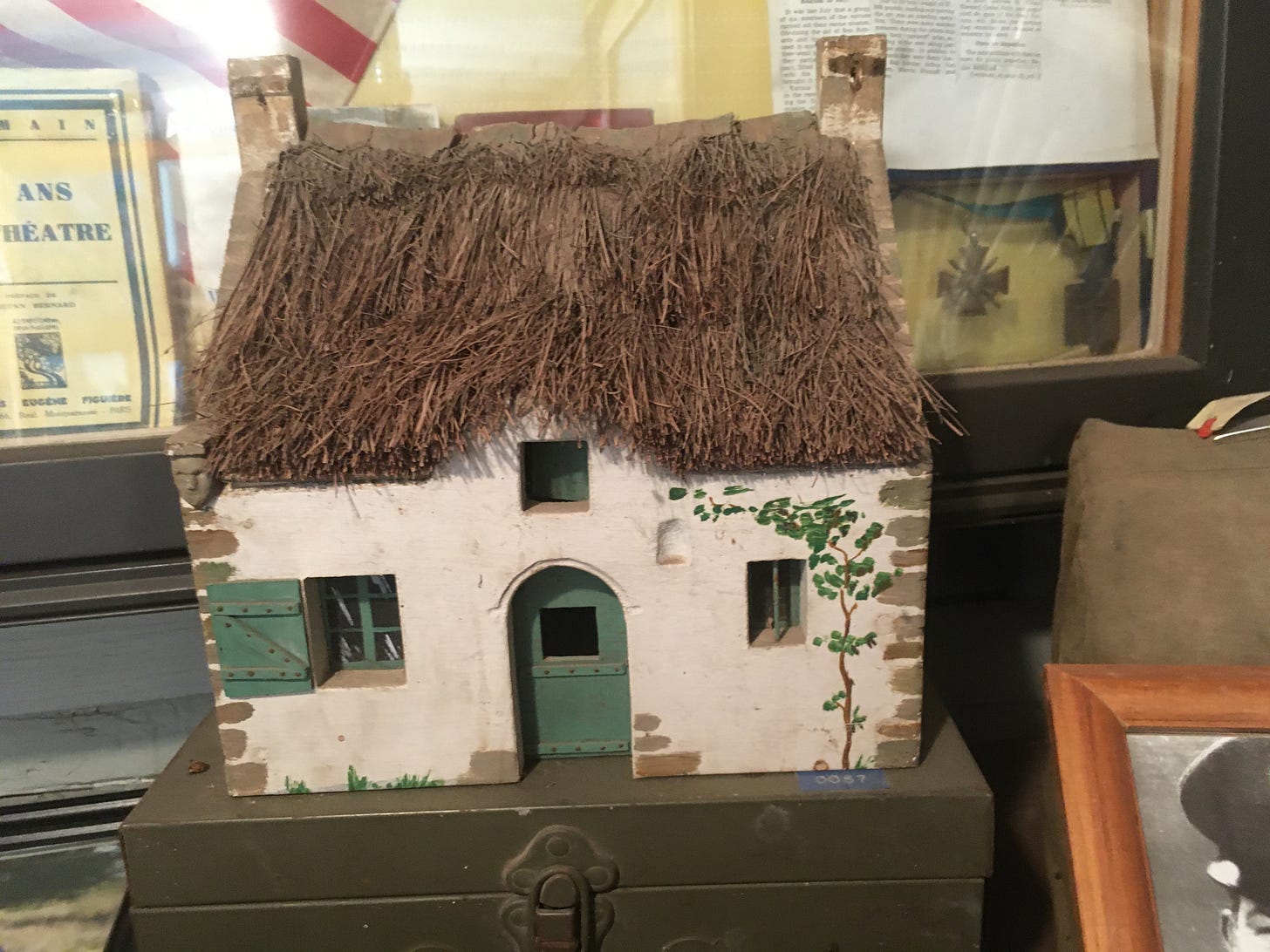France's post-WWII gift to Iowa still on display
Cedar Falls ag exhibit site has hosted 'Merci Train' boxcar since 1977
“Probably a junk dealer wouldn’t give more than 20 bucks for it, but this old car and the keepsakes inside it represent a million dollars’ worth of sentiment.”
— Drew Pearson, “Washington Merry-Go Round’ column, Nov. 11, 1949
CEDAR FALLS – It’s a gift given to the people of Iowa three generations ago, with the thanks of a grateful nation.
Not this nation, but from France.
It’s a 19th century rail boxcar – one of 49 gift-laden boxcars the French people sent in 1949 to their American allies through two world wars — allies who also saved them from starvation.
Once loaded with French treasures and keepsakes, it still contains some of those items but is mainly a curiosity.
Rick Grimm is available to satisfy people’s curiosity – as he continues restoring and preserving a little-remembered part of history.
"It still belongs to the state as far as I'm concerned," Grimm said. "It's a gift to the people. I just happen to be its custodian."
It sits at Antique Acres, a vintage farm machinery display site north of Cedar Falls on Waverly Road, known to locals as “old U.S. Highway 218,” between Cedar Falls and Janesville.
The boxcar will be open for public tours the weekend of Aug. 18-20 as part of Antique Acres’ 58th annual Old-Time Power and Equipment Show, or by appointment.
At the drop of a hat, Grimm will tell visitors how a 19th century French boxcar ended up in a field in the middle of Iowa.
It was known in French as a “Hommes 40, Chevaux 8” – in English, 40 men or eight horses, or simply, a “40 & 8.” That’s what it could hold. It was used to ship men and/or cavalry horses.

Such cars, built as general freight cars mainly in the middle to late 1800s, were used in World War I. They shipped American Expeditionary Force doughboys arriving in France to the front in 1917-18.
After the war, the returning U.S. doughboys, adopting the name of the boxcars they traveled on, formed national and local “40 and 8” societies -- formally, "La Société des Quarante Hommes et Huit Chevaux" — as an offshoot of, and later independent from, the American Legion.
Grimm, a U.S. Navy veteran and the grandson of a World War I veteran, is an officer of the state 40 and 8 society, and the local “Voiture 82” 40 and 8 Club in Black Hawk County, which he says still has about 20 members.
In World War II, after the fall of France in June 1940, Nazi forces commandeered the cars and used them for, among other purposes, hauling captured Americans and other Allied troops to prisoner of war camps.
According to Grimm and an online history published in 2000 from the 40 and 8 National Boxcar Association, in the years after the Allied victory in Europe in 1945, syndicated national Washington newspaper columnist Drew Pearson advocated a volunteer drive in which Americans privately raised $40 million worth of postwar food and relief supplies for the people or war-torn France and Italy. It was roughly concurrent with the U.S. government’s $13.3 billion “Marshall Plan” economic recovery aid to Europe, first proposed in June 1947 by President Harry Truman’s secretary of state, George C. Marshall.
An “American Friendship Train” carried more than 700 carloads of food, clothing and fuel donated in the private relief effort across France and Italy in 1947.
The French people reciprocated in 1949 with a “Merci Train,” loaded with artwork, handcrafts, fine lace, toys, and other gifts from the French people.

A video about the boxcar, courtesy of the Grout Museum District, is attached here:
They were loaded aboard the French maritime merchant ship Magellan, shipped to the United States and, via American rail, a “Merci Train” boxcar of gifts was delivered to each state. Many “40 and 8” veteran clubs in each of the states took responsibility for maintaining the individual car their respective states received.
In his syndicated column which appeared in the Feb. 15, 1949 Waterloo Courier and other papers, Drew Pearson reported how many of the states built display cases for the gifts, put the cars on display, or sent them on tour.
Iowa’s “Merci Train” car arrived in the city of Clinton on Feb. 12, 1949, and was received with a celebration and a considerable amount of press coverage. most extensively by the Davenport Democrat, a predecessor to the modern-day Quad-City Times. The train eventually made its way to Des Moines.

Grimm says sometine in the 1950s, Black Hawk County's “Voiture 82” 40 and 8 Club successfully appealed to the state of Iowa for permission to take and maintain the car for eventual location in a proposed "All Veterans Park "in Waterloo or somewhere in Black Hawk County. Due to an in-kind donation by a hauler who happened to be a "40 and 8" club member, it was transported from Des Moines to Waterloo.
The proposed park was never established; consequently, Iowa’s boxcar sat for years at the Black Hawk County 40 and 8 club headquarters or “chateau” along Black Hawk Creek on the southwest edge of town – until the city acquired the club site in the mid-1970s through eminent domain proceedings for a greenbelt and flood control project.
Then, according to Courier files, the car was moved to the Hultquist-Fry Military Reserve Center on Burton Avenue for restoration by local 40 and 8 club members and a volunteer group of Navy Seabees veterans. The car was included in Black Hawk County's 1976 parade celebrating the nation's bicentennial.
In 1977, the Courier reported, Antique Acres offered to house the boxcar on its site under a long-term agreement with the 40 and 8 club members.

Many of the boxcar’s original contents went to the State Historical Museum in Des Moines, Grimm said, but many remain – including watercolor artwork, handmade dolls and dollhouses, a large linen tablecloth and display cases of many such crafts, including some items 40 and 8 club members have added over the years.
Items added include the World War I uniform of Dick Grimm's grandfather, Harold Grimm, who lost a lung to poison gas in the war.
One prominent original item on display is a large Catholic prayer rosary bead chain which Grimm said was from Lourdes in France – a major Catholic pilgrimage site where it is said an apparition of the Blessed Virgin Mary appeared to St. Bernadette, a French peasant girl, in 1858.

Grimm and his father and fellow Navy veteran Junior Grimm, a former Waterloo police chief and former state leader or “grand chef de gare” for the 40 and 8 club in Iowa, cared for and maintained the boxcar for years. When Junior Grimm passed away in 2017, the primary responsibility for its upkeep fell on Rick Grimm, now 70 — and one of the club’s youngest members.
For Grimm, preserving and telling the story of the boxcar is a worthy venture. He has given periodic tours to individuals and civic organizations, in addition to tours during the Old-Time Power Show at Antique Acres.
"It's a big draw," Grimm said. "They love having it here, and we love having it here."
His goal, he said, is to continue the restoration and "try and get this back to looking like what it looked like when it was delivered to the state of Iowa in 1949." That includes replacing the now-stored shields representing the coats-of-arms of all he provinces of France on the sides of the boxcar. Like maintaining a house, it's a constant work in progress.
"I've been working on this for about six years now. It's something I grew up with," he said. “It just keeps me out of trouble."
And then some.
In addition to being open during the upcoming power show, tours are available by appointment by contacting Grimm at (319) 236-1020.
He'll also consider any offers of volunteer help with the restoration.
The Iowa Writers’ Collaborative
From our founder, Julie Gammack:
“We do not accept advertising. We are linking readers directly to Iowa writers. Our columnists are most appreciative to those of you who have the ability to become a paid subscriber of their work. For the cost of a double quarter pounder with cheese (a month) you can bring a smile to a columnist. Pick one or more, and help sustain this movement to provide thoughtful commentary.”
Laura Belin: Iowa Politics with Laura Belin, Windsor Heights
Doug Burns: The Iowa Mercury, Carroll
Dave Busiek: Dave Busiek on Media, Des Moines
Iowa Writers’ Collaborative, Roundup
Steph Copley: It Was Never a Dress, Johnston
Art Cullen: Art Cullen’s Notebook, Storm Lake
Suzanna de Baca: Dispatches from the Heartland, Huxley
Debra Engle: A Whole New World, Madison County
Julie Gammack: Julie Gammack’s Iowa Potluck, Des Moines and Okoboji
Joe Geha: Fern and Joe, Ames
Jody Gifford: Benign Inspiration, West Des Moines
Rob Gray: Rob Gray’s Area, Ankeny
Nik Heftman: The Seven Times, Los Angeles and Iowa
Beth Hoffman: In the Dirt, Lovilla
Dana James: New Black Iowa, Des Moines
Pat Kinney: View from the Cedar Valley, Waterloo
Fern Kupfer: Fern and Joe, Ames
Robert Leonard: Deep Midwest: Politics and Culture, Bussey
Letters from Iowans, Iowa
Tar Macias: Hola Iowa, Iowa
Kurt Meyer: Showing Up, St. Ansgar
Wini Moranville, Wini’s Food Stories, Des Moines
Kyle Munson, Kyle Munson’s Main Street, Des Moines
Jane Nguyen, The Asian Iowan, West Des Moines
John Naughton: My Life, in Color, Des Moines
Chuck Offenburger: Iowa Boy Chuck Offenburger, Jefferson and Des Moines
Barry Piatt: Piatt on Politics Behind the Curtain, Washington, D.C.
Dave Price: Dave Price’s Perspective, Des Moines
Macey Spensley: The Midwest Creative, Iowa
Larry Stone: Listening to the Land, Elkader
Mary Swander: Mary Swander’s Buggy Land, Kalona
Mary Swander: Mary Swander’s Emerging Voices, Kalona
Cheryl Tevis: Unfinished Business, Boone County
Ed Tibbetts: Along the Mississippi, Davenport
Teresa Zilk: Talking Good, Des Moines
The Iowa Writers Collaborative is also proud to ally with Iowa Capital Dispatch.




